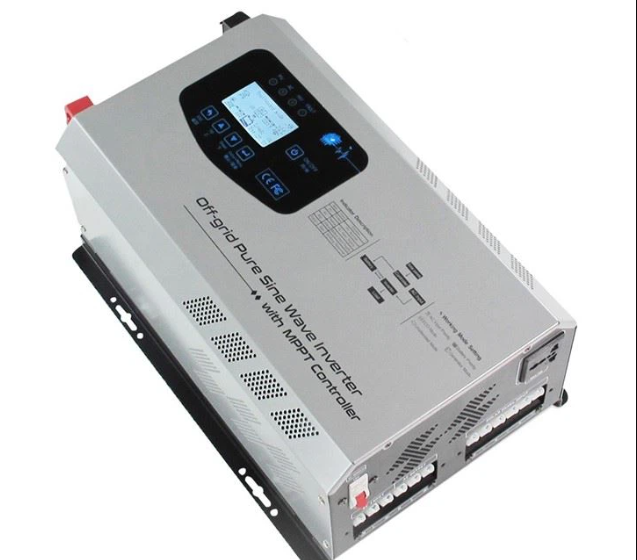In the quest for sustainable energy solutions, solar power stands out as one of the most reliable and eco-friendly sources of energy. With advancements in solar technology, systems are becoming increasingly efficient and versatile. Among these advancements is the 3KW 24V Hybrid Solar Inverter—a pivotal component in optimizing energy usage for both residential and commercial applications. This inverter not only converts solar energy into usable power for your appliances but also integrates energy storage solutions for greater flexibility and control over your energy supply.
In this article, we’ll explore the features, working principles, benefits, and applications of the 3KW 24V hybrid solar inverter, shedding light on why it is an essential part of modern solar energy systems.
What is a 3KW 24V Hybrid Solar Inverter?
A 3KW 24V hybrid solar inverter is a type of inverter designed for use in solar power systems, specifically those that generate or store power at 24 volts. The 3KW capacity indicates the inverter can manage and convert up to 3 kilowatts (3000 watts) of electrical power, which is typically sufficient for homes with moderate to high energy needs.
The hybrid aspect refers to the inverter’s ability to manage both solar energy and stored battery power, providing a seamless energy solution for users. It functions by converting DC (direct current) electricity from the solar panels and battery into AC (alternating current) electricity, which can be used to power household appliances and devices.
Additionally, hybrid inverters come with an integrated charge controller that ensures batteries are charged efficiently while maintaining safe operating conditions. This dual functionality allows hybrid inverters to support both energy generation and storage, improving the overall performance and reliability of the solar system.
Key Features of a 3KW 24V Hybrid Solar Inverter:
- 3KW Power Output: Suitable for residential applications with moderate energy requirements.
- 24V System: Ideal for medium-sized solar setups.
- Hybrid Functionality: Combines an inverter and battery charge controller into one unit.
- Grid-Connected and Off-Grid: Offers flexibility in system design for either grid-tied or off-grid solar systems.
- Battery Charging and Management: Automatically manages battery charging and ensures efficient energy storage.
How Does a 3KW 24V Hybrid Solar Inverter Work?
The operation of a 3KW 24V hybrid solar inverter revolves around its ability to perform several key tasks in managing solar energy, storage, and consumption. Below is a step-by-step breakdown of how it works:
1. Solar Power Conversion
Solar panels generate DC power when exposed to sunlight. The inverter’s primary job is to convert this DC power into AC power, which is used by most appliances in the home. This AC output is fed directly into the household grid or distribution panel.
2. Battery Charging
The hybrid inverter also functions as a charge controller. During the day, when the solar panels generate more electricity than is required for immediate use, the inverter directs excess power to charge the connected battery bank. The inverter monitors the battery’s charge level to prevent overcharging, ensuring the batteries remain in good condition for future use.
3. Battery Discharging
At night or during periods of low sunlight, when the solar panels are not generating enough electricity, the inverter can draw power from the batteries. This stored energy is then converted into AC power to keep appliances running without the need for grid electricity. This backup power ensures energy reliability even when solar generation is unavailable.
4. Grid Connection (Optional)
Some hybrid inverters have the ability to interact with the electrical grid. If the system generates more power than is needed, the excess energy can be fed back into the grid, potentially earning the user credits or monetary compensation depending on local regulations. This feature is known as net metering and allows homeowners to profit from their solar energy generation.
5. Intelligent Energy Management
Hybrid inverters often come with built-in energy management systems (EMS) that intelligently prioritize the energy sources based on availability and demand. The EMS ensures that solar power is used first, followed by battery power, and finally, grid power if needed. This optimizes the use of stored solar energy while minimizing reliance on the grid.
Benefits of Using a 3KW 24V Hybrid Solar Inverter
1. Energy Independence
One of the key benefits of using a 3KW 24V hybrid solar inverter is the ability to reduce dependence on the power grid. By integrating solar power generation and battery storage, users can rely on their solar system for most of their energy needs. This is especially beneficial for off-grid locations, where accessing the power grid is not feasible.
2. Cost Savings
Although the initial installation cost of a solar power system with a hybrid inverter can be higher, it is an investment that pays off in the long run. By reducing or eliminating electricity bills and generating credits for excess energy sent back to the grid, users can see a significant reduction in their energy costs. The energy storage capability also ensures that users can avoid high electricity rates during peak hours.
3. Eco-Friendly Energy Solution
Solar power is a renewable, clean energy source that does not produce harmful emissions. By switching to a solar-powered system, homeowners and businesses can significantly reduce their carbon footprint and contribute to environmental sustainability. Using a hybrid inverter makes this process more efficient by maximizing solar energy usage.
4. Continuous Power Supply
With its ability to store energy in batteries, a 3KW 24V hybrid solar inverter ensures a continuous power supply, even during power outages or times when solar generation is low. This provides peace of mind and ensures essential appliances, such as refrigerators or medical equipment, continue running without interruption.
5. Battery Efficiency and Longevity
The integrated charge controller in the hybrid inverter ensures that the battery bank is properly managed, preventing overcharging or deep discharging. This not only prolongs the lifespan of the battery but also optimizes its performance, ensuring that energy is stored and used efficiently.
6. Flexible Integration with Grid Power
A hybrid inverter that is grid-connected offers flexibility, allowing users to interact with the grid when necessary. Whether through net metering or backup power, a hybrid inverter enables users to balance between solar power, battery storage, and grid electricity for optimal energy management.
Applications of a 3KW 24V Hybrid Solar Inverter
1. Residential Solar Power Systems
A 3KW 24V hybrid solar inverter is ideal for residential homes, particularly those with moderate energy demands. With its ability to convert solar energy into AC power, charge and discharge batteries, and optionally interact with the grid, it provides a reliable and cost-effective solution for homeowners.
2. Off-Grid Solar Systems
For remote locations where access to the electricity grid is unavailable, a 3KW 24V hybrid inverter is an excellent choice for creating an off-grid solar power system. The inverter ensures that power is available at all times by storing excess solar energy during the day and using it at night or during cloudy periods.
3. Small Businesses and Commercial Spaces
Small businesses, such as cafes, retail stores, and workshops, can benefit from the energy savings and reliability provided by a 3KW 24V hybrid solar inverter. It allows them to reduce electricity costs, especially during peak hours, and ensures they have a backup power source in case of outages.
4. Emergency Backup Power
A hybrid solar inverter system can act as an emergency backup solution for households and businesses. By storing energy in batteries, users can have access to electricity during power outages or during times of grid instability, ensuring the continued operation of essential devices.
5. Electric Vehicle Charging Stations
Some homeowners with electric vehicles (EVs) use 3KW 24V hybrid solar inverters to power EV chargers. The inverter can convert solar energy into power for the EV, while managing battery storage to ensure that the charging process is efficient and cost-effective.
How to Choose the Right 3KW 24V Hybrid Solar Inverter
When selecting a hybrid inverter, several factors should be considered:
- Power Output: Ensure the inverter can handle the peak power requirements of your home or business. A 3KW inverter is suitable for moderate to high power demands.
- Battery Compatibility: Check the inverter’s compatibility with your battery bank. Ensure that the inverter is designed to work with 24V batteries and can handle the charging and discharging process effectively.
- Grid Connection: If you want to participate in net metering, make sure the inverter is compatible with grid connections and offers the ability to send excess power back to the grid.
- Efficiency: Look for inverters with high efficiency to minimize energy losses during conversion.
- Safety Features: Choose an inverter with built-in protection features such as overload protection, short circuit protection, and temperature control to ensure the safety and longevity of the system.
Conclusion
The 3KW 24V hybrid solar inverter is a powerful and efficient solution for anyone looking to optimize their solar energy system. With its ability to manage solar energy, battery storage, and grid interaction, this inverter offers increased energy independence, reduced electricity costs, and a reliable power supply. Whether for residential use, off-grid applications, or small businesses, a hybrid inverter is a smart investment for a sustainable and cost-effective energy future.



